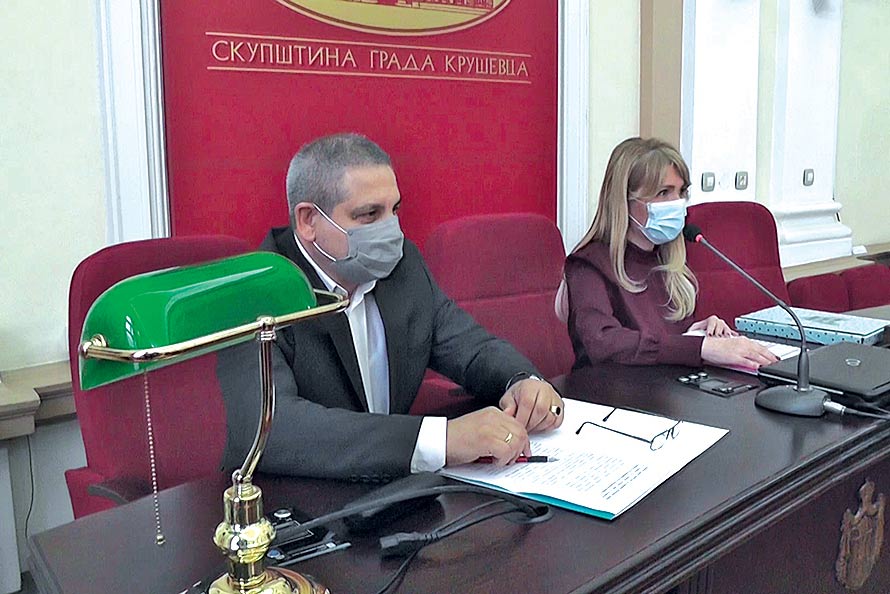From 26th January 2020, when China closed all educational institutions, until 27th March, almost 90 per cent of educational institutions worldwide were shutdown. Classes shifted to the virtual world, but – believe it or not – almost no one was happy about that.
CHILDREN NEED KNOWHOW THAT ENABLES THEIR SWIFT EMPLOYMENT
Gabrijela Grujić Ph.D., Assistant Minister for Dual and Entrepreneurial Education at the Ministry of Education, Science and Technological Development, recently discussed the improvement of the enrolment plan for dual educational profiles for the next school year at a meeting with the principals of secondary vocational schools of the Rasina and Raška administrative districts. She stressed that the Ministry is obliged to create profiles in accordance with the needs of the economy, and to consider what young people will need in the future.

On the territory of Rasina District, classes are implemented in nine vocational schools in six municipalities, where work will be conducted on the verification of a new profile – forensics technician – at the initiative of the Chemical- Technological School.
On the territory of the Raška District, classes are implemented in 14 vocational schools in five municipalities, with 11careas of work represented. The enrolment policy is crucial for the City of Kraljevo due to the reduction of unemployment levels, which is only possible if schooling trains future personnel that are in demand and can satisfy the needs of companies with their knowhow and skills.
SCIENTIFIC AND TECHNOLOGICAL DEVELOPMENT STRATEGY ADOPTED
Early February saw the Government of Serbia adopt the Strategy of Scientific and Technological Development of the Republic of Serbia for the period from 2021 to 2025, entitled “The Power of Knowledge”. First Deputy Prime Minister and Minister of Education, Science and Technological Development Branko Ružić said that this Strategy recognises knowhow and science as the foundations of future economic progress and the development of education.

“The strategy of scientific and technological development enables the continuation of reforms launched in this area and brings measures that will provide the conditions necessary for the dynamic development of science, research and innovation,” said Minister Ružić.
This Strategy aims to speed up the development of Serbia, as well as its integration into the European research area, through the improvement of the scientific-technological and innovation system. The additional strengthening of scientific research institutions and investment in infrastructure are envisaged, while the Strategy also envisages greater investment in individuals to ensure that leading researchers are recognisable at the global level.
STATE MATURITY DIPLOMA POSTPONED FOR AT LEAST A YEAR
“The State maturity diploma almost certainly won’t be introduced in 2022, due to the circumstances in which our society has found itself under the influence of the Coronavirus, but also due to the necessary triage,” said First Deputy PM and Minister of Education, Science and Technological Development Branko Ružić, though he did not specify a new date for its introduction.
He added that a working group has been formed to monitor the preparation of each of the phases of the state maturity diploma and that the right time to introduce it to the education system will be announced soon, and that higher education institutions should also be included in this process.

According to plans published previously, high school pupils should take a general maturity diploma exam, pupils of secondary vocational schools should take a vocational maturity exam, and pupils of art schools should take an art maturity exam. The general maturity diploma exam includes tests in Serbian grammar, mathematics and a third area from the list of general education subjects – foreign language (English, Italian, German, Russian, French, Spanish), history, geography, biology, chemistry and physics. University faculties then determine lists of subjects that they will score for enrolment, with pupils choosing which subject to take as an elective on the basis of the college they want to attend.
PARENTS AND SOME PUPILS STILL PROTESTING DUE TO ONLINE CLASSES
Judging by the claims of parents and teachers, but also the actions of pupils, online teaching carries lots of problems, primarily due to the fact that it has lasted too long and an approximate deadline for returning to school desks remains completely unknown. Parents, particularly those who work from home and have more than one child, have a problem organising their life and work to be able to monitor teaching and learning, while they are worried about the lack of socialisation and interaction that every child requires, but also the fact that children don’t approach remote learning with sufficient seriousness.

On the other side, representatives of the Association of Teachers’ Unions of Serbia (USPRS) say that everything would be easier and better if the digitisation of schools, which was promised in 2016, had been implemented. Parents and teachers were forced to cater for fast Internet connections, to buy new computers or laptops, because not all children and both parents can follow classes and work on a single computer… Online teaching has proven to be great challenge for many families who aren’t in an enviable financial situation, for children and teachers from small towns, remote and poor environments, where internet connections are very slow or even non-existent, which teachers believe will be reflected on the level of knowledge with which children will enter the next grades.
REDUCED TUITION FEES AT THREE BELGRADE FACULTIES!
According to the plan for enrolment in the budget of the faculties of the University of Belgrade for the 2021/22 academic year, 14,924 students should be enrolled in basic academic studies, 9,587 in master’s academic studies and 1,913 in doctoral studies. There will be 9,597 budget places for basic academic studies, 3,983 budget places for master’s academic studies and 634 for doctoral studies.

Tuition fees have been reduced for doctoral studies at the Faculty of Economics, for studies at the Faculty of Security, but also at the Faculty of Mathematics, where they say that the cost of basic academic studies has been reduced by 19,000 dinars. Tuition fees have only increased (by 50 euros) for foreign students in master’s academic studies at the Faculty of Organisational Sciences.
HOW TO IMPROVE YOUTH EMPLOYABILITY AND STRENGTHEN COMPANIES’ COMPETITIVENESS
The Regional Challenge Fund organised a national conference for Serbia, via the Zoom platform, which saw the presenting of the possibilities and advantages of the Fund, which is the first financial mechanism of its kind aimed at improving the employability of young people and strengthening the competitiveness of companies in the Western Balkans.

This conference, which was dedicated to presenting the first call for submitting Expressions of interest, brought together representatives of international organisations and initiatives, regional organisations, public institutions responsible for vocational education and training, chambers of commerce, institutions that provide vocational education and training, and companies.
Participants in the conference included Miloš Blagojević, Assistant Minister for Secondary and Adult Education of the Republic of Serbia, Christian Schilling, First Secretary and Head of Development Cooperation at the Embassy of the Federal Republic of Germany in Belgrade, Rudiger Hartmann, Director of the Belgrade Office of German Development Bank KfW, Mirjana Kovačević, Head of the Chamber of Commerce & Industry of Serbia’s Education Division, Frieder Woehrmann, Team Leader of the Project Management Unit at the Regional Challenge Fund, and Ivan Stojanović, GIZ Serbia Senior Project Manager.